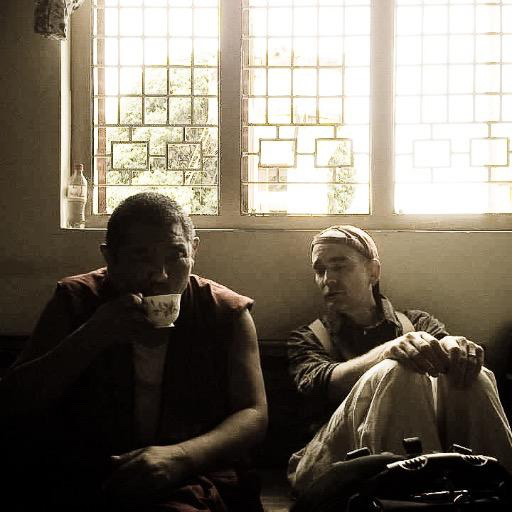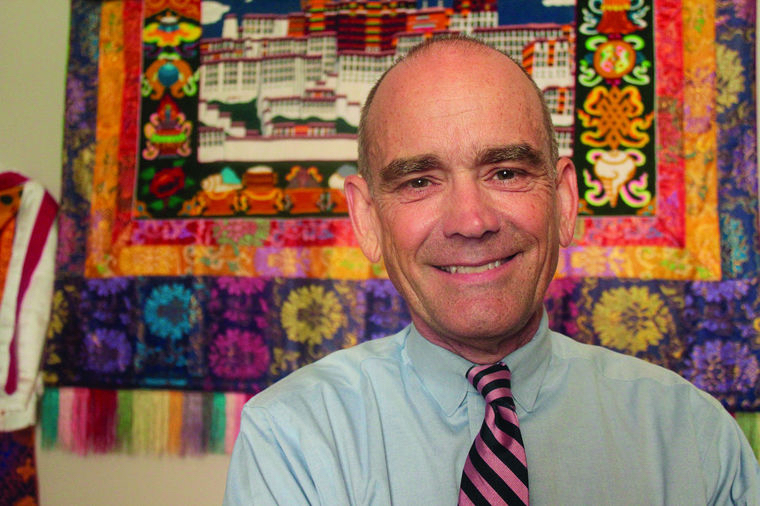A lot can happen in nearly a quarter century — children can grow into college students, universities can grow in prestige and enrollment, and an honors program can be transformed, thanks in large part to one tireless professor.
Enter Sidney Burris, professor of English in the Department of English at the J. William Fulbright College of Arts and Sciences.
Burris has served as director of the Fulbright College Honors Program for the past 23 years. And during that time, he has been the backbone of the 61-year-old program, creating innovative curricula, helping to conceptualize what would become the university's Honors College, and changing the lives of thousands of students.
Now, Burris is transitioning into the next phase of his academic career and will step down as director on Aug. 15, allowing time to help incoming director Kirstin Erickson, associate professor in the Department of Anthropology, acclimate to the role.
"It's hard to even imagine the Fulbright Honors Program without Sidney at this point," said Donald R. Bobbitt, president of the University of Arkansas System and former dean of Fulbright College. Bobbitt is one of six deans Burris has worked for during his tenure as director.
"Sidney has created an amazing legacy, shaping the lives of so many of our students through the Sturgis Fellowships and H2P (the Honors Humanities Project), by helping found the Honors College, and by bringing the Dalai Lama to the U of A and working extensively with Tibetans in exile," Bobbitt said. "It has been an honor to work with him, and I cannot wait to see what his future holds - it is certain to be great."
The Early Days
Burris began his career at the University of Arkansas in 1986 after obtaining his B.A. in Classical Studies at Duke University and his Ph.D. in English at the University of Virginia.
 Sidney Burris, center, with participants during a TEXT Project study abroad trip. |
Burris didn't set out to become director of the Fulbright College Honors Program, but he agreed to help a former colleague who was in the role when she needed to leave for a year. The time went by quickly and he stepped aside, only to be asked to take up the program's helm again the following year. "This time, I never left," he joked.
"I began as a novice administrator, but grew to appreciate and cultivate the expanding mission of the Fulbright College Honors Program," Burris said. "As the program grew, so too did I, and I found, every year, new challenges that kept the job fresh and exciting."
After being founded in the fall of 1955 starting with only two students, the program quickly built a rich history. But when Burris took charge in 1993, it was time for the Fulbright College Honors Program to grow, to take on new challenges and adopt new goals.
In 1995 thanks to an NEH grant, Burris, along with the directors of the college's Humanities Program, helped conceptualize, teach and administer the Honors Humanities Project, known as H2P. He ended up teaching in H2P for 14 years.
"The original four-semester sequence of courses grew to become one of the most popular, innovative and rigorous classroom experiences in the university," Burris said. "And, it continues to provide a model of cutting-edge faculty-instruction and student involvement."
Additionally, Burris helped grow and fund the Sturgis Fellowship Program, which offers undergraduate fellowships to exceptionally talented students with the intellectual potential to become future leaders in our society.
"I arrived on campus the same year, coincidentally, that the first Sturgis Fellows arrived," Burris said. "My career at Arkansas has overlapped exactly with the Sturgis Fellows, and my involvement with these extraordinary students is one of the many reasons that I remained in the director's position as long as I did."
Running the fellowship meant Burris also worked with the college's development office to shepherd more than $16 million in gifts from the Sturgis family, and to distribute nearly $300,000 in grant awards and fellowships each year.
"To facilitate the education of these talented students at that level is a pleasure that I will surely miss," he said.
Past Sturgis Fellows credit Burris with helping them succeed.
"He encouraged me to hone my writing skills and develop a strategic plan in addition to simply excelling in my classwork. He genuinely believed in his students and had an amazing ability to help them find their unique voice," said Anna R. Terry, former Sturgis Fellow, Rhodes Scholar, and neurosurgeon at Duke University Hospital.
Terry said there are only about 30 female academic neurosurgeons in the U.S. and that she was the first woman in her medical residency program in more than 15 years.
"The honors program at the U of A was a huge part of being able to develop the academic rigor, self-confidence and communication skills I needed to thrive in that environment. Sidney may not be aware of his role in this, but I give him a lot of credit," she said.
Major Milestones
In 2000, members of central administration asked Burris to "imagine" an Honors College for the University of Arkansas.
He outlined several budgetary options, and sketched out a few possible scenarios. Two years later, many of those plans came to fruition when the University of Arkansas received a $300 million gift from the Walton Family Charitable Support Foundation - at the time the largest gift in the history of American public higher education.
 Geshe Thupten Dorjee, left, and Sidney Burris. |
This generous gift created the Honors College in 2002, and a large portion of the gift allowed the new college to endow fellowships and scholarships to recruit exceptionally talented students and to endow special funds to provide study abroad and undergraduate research opportunities for honors students.
Today more than 3,000 students and 700 professors from every college and major on campus participate in Honors College activities in the classroom, in laboratories and studios, and at sites around the world.
"Sidney was instrumental to the creation of the Honors College," said Todd Shields, dean of Fulbright College. "But he didn't stop there. He's always looking to make, grow and nurture programs that better our students and the world. It's just who he is at his core."
Shields said the next major milestone for Burris came in 2007, when he founded the Tibetans in Exile Today Program, known as the TEXT Program, with Geshe Thupten Dorjee.
The TEXT Program involves students studying abroad, interviewing Tibetan refugees living in exile in India and compiling an oral history of their experiences and memories. The interviews are part of a growing online archive.
The success of The TEXT Program, which has won several awards including the John A. White Award for Faculty-Student Collaboration and the ESPNU SEC Stories of Success Award, was part of the reason that the Dalai Lama accepted the university's invitation to visit campus in 2011.
Alexandra Jewell, former Sturgis Fellow and current Ph.D. candidate in the Department of Philosophy, traveled to India three times with Burris and the TEXT Program, and credits this experience with helping her find her passion in life.
"[Dr. Burris] was always a guiding voice, a mentor and friend, who supported my goals and inspired me to chase my dreams," Jewell said.
"During those trips, Dr. Burris and I would discuss Buddhist philosophy and the practical applications for our society," she said. "I am currently studying Buddhist philosophy and its relation to personal development for five months in India. I plan to incorporate this knowledge into a primary curriculum and provide our children with the tools to confront the many problems we face today."
Next Steps
As for Burris, he credits his faculty colleagues for the success of the Fulbright College Honors Program, which now has more than 1,100 students.
"The faculty we have here and the volunteer spirit that is so abundant among them, keeps the honors program going year to year," he said. "Any success the program has enjoyed is directly attributable to their hard work in service of our extraordinary students. I am confident that with our faculty and a new director, the program and its students will continue to shine."
Fulbright College will host a celebration commemorating Burris' service in the fall, after his last day as director on Aug. 15.
Afterward, Burris plans to focus on his work with the TEXT Program and teach English courses while also pursing new writing projects.
Burris has previously published two books of poems, a book of literary criticism, and a number of critical and personal essays, which have won several awards. He specializes in 20th-century literature and creative nonfiction.
He also regularly offers classes in human-rights literature and co-teaches the history of nonviolence with Geshe Thupten Dorjee.
Burris will continue to work with students, but many say they will miss him in his role of Fulbright College Honors Program director.
"His hard work to put students first and give them opportunities to better the global community has impacted countless numbers of people," said Bobby Howard, a former Sturgis Fellow and current a doctoral fellow in the Department of Philosophy. "Congratulations, Dr. Burris! Thank you for your commitment and your years of faithfulness."
Topics
Contacts
Andra Parrish Liwag, director of communications
J. William Fulbright College of Arts and Sciences
479-575-4393,
